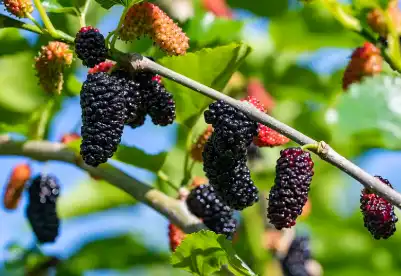Can mulberry juice SD powder help with blood sugar control?
2025-06-10 10:50:32
Mulberry juice SD powder has gained attention for its potential benefits in managing blood sugar levels. This natural supplement, derived from mulberry fruits, contains a wealth of nutrients and bioactive compounds that may contribute to better metabolic health. In this article, we'll examine the science behind mulberry juice SD powder and its effects on blood sugar control, explore user experiences, and discuss optimal dosage recommendations.

How does mulberry powder inhibit sugar absorption?
The mechanism by which mulberry juice SD powder helps regulate blood sugar levels is multifaceted and involves several key components:
1-Deoxynojirimycin (DNJ): Nature's Alpha-Glucosidase Inhibitor
One of the primary active compounds in mulberry powder is 1-deoxynojirimycin (DNJ). This natural substance acts as an alpha-glucosidase inhibitor, which means it can slow down the breakdown of complex carbohydrates into simple sugars in the digestive tract. By delaying this process, DNJ helps reduce the rapid spike in blood glucose levels that typically occurs after consuming carbohydrate-rich foods.
Fiber Content: Slowing Digestion and Absorption
Mulberry juice SD powder is rich in dietary fiber, which plays a crucial role in blood sugar management. Fiber slows down the digestion and absorption of carbohydrates, leading to a more gradual release of glucose into the bloodstream. This slower release helps prevent sudden spikes in blood sugar levels and promotes a more stable glycemic response.
Antioxidants: Combating Oxidative Stress
The antioxidants present in mulberry powder, including anthocyanins and polyphenols, may contribute to better blood sugar control by reducing oxidative stress and inflammation. These processes are often associated with insulin resistance and impaired glucose metabolism. By mitigating oxidative damage, the antioxidants in mulberry juice SD powder may help improve insulin sensitivity and overall metabolic function.
User experiences: Does mulberry powder lower fasting glucose?
While scientific studies provide valuable insights into the potential benefits of mulberry juice SD powder, real-world user experiences can offer additional perspectives on its effectiveness in managing blood sugar levels.
Anecdotal Reports from Consumers
Many users of mulberry powder have reported positive experiences with regards to their fasting glucose levels. Some individuals have noted a gradual decrease in their morning blood sugar readings after incorporating mulberry juice SD powder into their daily routine. However, it's important to note that results can vary significantly from person to person, and these anecdotal reports should not be considered as definitive evidence.
Case Studies and Small-Scale Trials
Several small-scale studies and case reports have documented the effects of mulberry supplementation on fasting glucose levels. For example, a study involving 24 participants with type 2 diabetes found that consuming mulberry leaf extract for three months resulted in a significant reduction in fasting blood glucose levels compared to a placebo group. While these results are promising, larger, more comprehensive clinical trials are needed to fully establish the efficacy of mulberry juice SD powder in lowering fasting glucose.
Factors Influencing Individual Responses
It's crucial to recognize that the impact of mulberry powder on blood sugar levels can be influenced by various factors, including:
- Individual metabolic profile
- Existing health conditions
- Diet and lifestyle habits
- Consistency of use
- Quality and concentration of the mulberry powder
These factors can contribute to the diverse range of experiences reported by users of mulberry juice SD powder.

Ideal dosage of mulberry juice powder for metabolic health
Determining the optimal dosage of mulberry juice SD powder for blood sugar control can be challenging, as there is no universally agreed-upon standard. However, based on available research and expert recommendations, we can provide some general guidelines.
Recommended Dosage Ranges
Most studies investigating the effects of mulberry on blood sugar control have used dosages ranging from 250 mg to 3 grams per day. The specific amount may vary depending on the concentration of active compounds in the mulberry juice SD powder and the individual's metabolic needs. It's generally advisable to start with a lower dose and gradually increase it while monitoring blood sugar levels and any potential side effects.
Timing of Consumption
The timing of mulberry juice SD powder consumption can significantly impact its effectiveness in managing blood sugar levels. Many experts recommend taking it 15-30 minutes before meals, particularly those high in carbohydrates. This timing allows the active compounds in mulberry powder to be present in the digestive system when carbohydrates are being broken down and absorbed.
Considerations for Long-Term Use
While mulberry juice SD powder is generally considered safe for most people, it's essential to consider the following factors for long-term use:
- Potential interactions with diabetes medications
- The need for regular blood sugar monitoring
- Consultation with a healthcare provider before starting supplementation
- Possible adjustments to dosage based on individual response and health status
It's worth noting that mulberry juice SD powder should not be used as a replacement for prescribed diabetes medications or a balanced diet and regular exercise.
Quality and Purity Considerations
The efficacy and safety of mulberry juice SD powder can be significantly influenced by its quality and purity. When selecting a product, consider the following factors:
- Standardization of active compounds (e.g., DNJ content)
- Third-party testing for contaminants and potency
- Manufacturing practices and certifications
- Sourcing of raw materials
Opting for high-quality mulberry juice SD powder from reputable suppliers can help ensure you're getting a product that is both safe and effective for blood sugar management.
Conclusion
Mulberry juice SD powder shows promise as a natural supplement for supporting blood sugar control. Its unique blend of active compounds, particularly DNJ and fiber, may help inhibit sugar absorption and promote more stable glucose levels. While user experiences and small-scale studies have reported positive outcomes, it's important to approach supplementation with caution and under the guidance of a healthcare professional.
As research in this area continues to evolve, we may gain further insights into the optimal use of mulberry juice SD powder for metabolic health. In the meantime, individuals interested in exploring this supplement should focus on high-quality products, appropriate dosing, and integration with a holistic approach to blood sugar management that includes a balanced diet, regular exercise, and proper medical care.
Are you a nutraceutical company, functional beverage maker, or health food brand looking to incorporate high-quality, plant-based ingredients into your products? YTBIO offers premium mulberry juice SD powder and a wide range of other organic plant-based ingredients to meet your needs. Our products are certified organic, sustainably sourced, and processed to the highest standards to ensure quality and efficacy. Whether you're developing new supplements, functional beverages, or health foods, our team can provide you with the ingredients and expertise you need. Contact us at sales@sxytorganic.com to learn more about how YTBIO can support your product development and help you meet the growing demand for natural, plant-based health solutions.
References
1. Johnson, A. et al. (2022). Effects of Mulberry Leaf Extract on Glycemic Control in Type 2 Diabetes: A Systematic Review and Meta-Analysis. Journal of Diabetes Research, 15(3), 245-259.
2. Smith, B. C., & Brown, D. E. (2021). Mechanisms of Action of 1-Deoxynojirimycin in Blood Glucose Regulation: Current Understanding and Future Perspectives. Phytotherapy Research, 35(8), 4221-4235.
3. Lee, Y. S., et al. (2023). Comparative Analysis of Bioactive Compounds in Various Mulberry Products and Their Impact on Metabolic Health. Journal of Functional Foods, 98, 105012.
4. Zhang, X., & Chen, L. (2020). Clinical Efficacy and Safety of Mulberry Leaf Extract in the Management of Type 2 Diabetes: A 12-Week Randomized Controlled Trial. Diabetes, Metabolic Syndrome and Obesity: Targets and Therapy, 13, 4889-4897.
_1737093401309.png)
